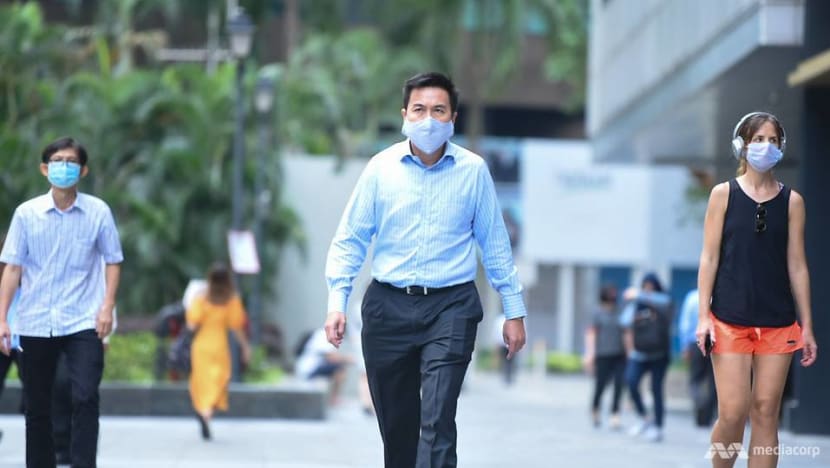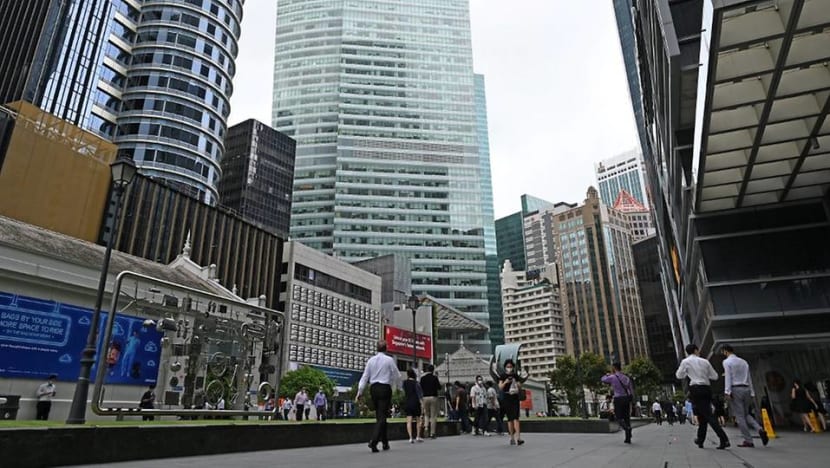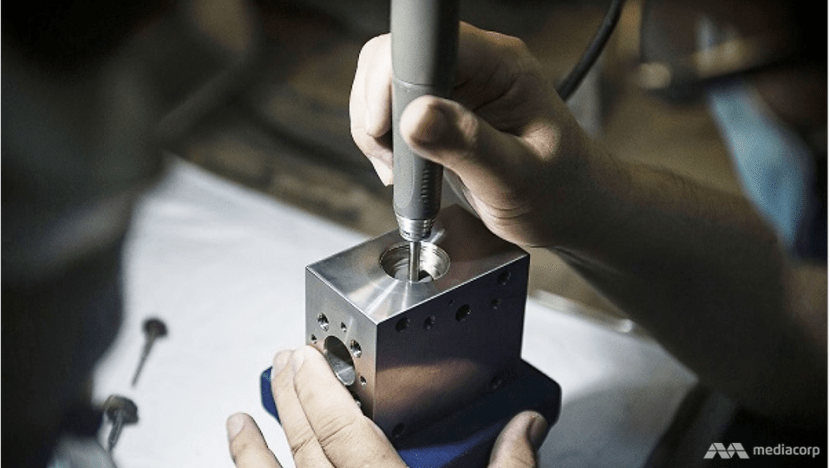commentary Commentary
Commentary: Singaporeans have more opportunities for jobs with Budget 2021
The targeted measures in Budget 2021 are designed to keep Singaporean workers afloat – but also for them to think about new opportunities says NUS Business School economist Cai Daolu.

People wearing masks at Raffles Place. (Photo: Gaya Chandramohan)
SINGAPORE: It has been said many times but this pandemic is unlike any other economic cycle in history.
It has unleashed a slew of drastic structural changes to the Singapore economy and sectors which have thrived for decades – like tourism and travel – have found themselves looking into the barrel of a very frightful gun.
Which is why this year’s Budget had to dip into the country’s reserves to shore up workers and businesses who still needed help and set the stage for them to pivot into a vastly different future.
A key plank in this strategy is the Jobs Support Scheme which will be extended in a targeted fashion. Companies in sectors severely hit by the pandemic, like aviation, aerospace and tourism will continue with wage support from April to September.
READ: Commentary: SIA's resumption of daily non-stop flights to key US cities - how necessary are they?
For other sectors, including food services, retails and marine, the wage support will be extended from April until June.
This temporary wage support scheme is essential to prevent bankruptcy risk and avoid mass layoffs – which will deeply affect households.
The alternative would have been to let a large number of companies – some of which are well-established – to go out of business and workers out of work.
It takes time to build successful businesses, some brands have been painstakingly built up over the years and this is not the time to leave them to fend for themselves.
READ: Commentary: Companies and workers, forget life before COVID-19. Budget 2021 will help us prepare for life after it

Many are fundamentally sound and simply need more time and support to survive this extraordinary and temporary negative shock. After all, closed borders are completely out of their control.
SHORT TERM HELP, LONG TERM BENEFITS
Keeping current workers employed also brings immediate and long-term benefits. The most immediate one being the prevention of further financial hardship resulting from the pandemic.
It is also important to note that the human capital of furloughed workers who have experienced a long spell of unemployment will erode and that in turn will translate into lower wages upon re-employment.
Workers separated from distressed firms suffer long-term wage losses averaging 25 per cent per year according to a 1993 paper in the American Economic Review.
READ: Commentary: Paying nurses more is long overdue but they need clearer professional ladders too
Furthermore, human capital tends to deteriorate significantly with long spells of unemployment and that in turn can translate into higher unemployment in the future, as a 2008 published research into European unemployment shows.
So a targeted measure like the Jobs Support Scheme can counteract the severe detrimental long-term scarring effect this crisis can have on workers and businesses.
Moreover, by extending support through SGUnited Skills and an additional S$5.4 billion allocated to a second tranche of the Jobs and Skills Package, the Government will help minimise the long-term effects on those who do get displaced.
SIGN UP: For CNA’s Commentary newsletter so you get our best offerings each week
MATCHING JOB SEEKERS WITH JOBS
For Singaporean job-seekers, out of the additional S$5.4 billion allocated for the Jobs and Skills package this year, S$5.2 billion will be put into the Job Growth Incentive (JGI) with the aim of hiring 200,000 locals.

This comes on top of the S$3 billion set aside last year for the same initiative.
Already there is evidence that these programmes can support mid-career jobseekers and fresh graduates looking for full-time positions in growing firms.
In the two months that the JGI was implemented last year, 110,000 local jobseekers found employment. The S$5.2 billion allocated to the JGI now will help extend the hiring window by seven months until September.
Providing support for recent graduates is essential to the future of the country. Graduating into a recession can have long-term consequences beyond the period of a recession.
READ: Commentary: Forget uni for now. After the A-Levels, get work experience first
A 2021 paper in the American Economic Journal: Applied Economics showed that those who have the bad luck of graduating in a recession tend to start in smaller firms and lower paying jobs. They also have large initial earning losses – about 9 per cent of annual earnings.
This gap does not disappear until about 10 years after graduation.
For that reason, these targeted measures, with enhanced support for fresh graduates, can help to counteract this detrimental effect that a pandemic-induced recession may have on their lifetime earnings.
READ: Commentary: COVID-19 could shrink earnings of 2020 graduates for years to come
KEEPING AN EYE ON THE FUTURE
While the first order of business has been to keep Singaporeans safe and protect livelihoods in this crisis, it is also important to keep an eye on the future.

Given the dynamic nature of technological progress and the disruptive nature of the current pandemic, some jobs will simply disappear permanently.
In a recent World Economic survey, over 80 per cent of businesses report that they are accelerating the automation of their work processes.
Jobs at high risk of being displaced include data entry clerks, administrative and executive secretaries, accountants and auditors, assembly and factory workers.
In contrast, there will be an increasing demand for data scientists, digital and strategy specialist and process automation specialists.
READ: Commentary: Let’s stop overstating the value of a university degree beyond your first job
READ: Commentary: COVID-19 - time for businesses and workers to have the guts to embrace the new normal
But this means a swathe of new opportunities. For example, we have seen a boom in the medical device business, biotech, and technology businesses that provide solutions to food production and education, among others.
In his speech, Deputy Prime Minister Heng Swee Keat announced more initiatives for companies to embrace digitalisation and new frontier technologies.
These high-quality and high-demand jobs will surely be in industries that are innovative and intensive in R&D.
Moreover, in the manufacturing sector, the Finance Minister also announced a reduction of quota of foreign workers, indicating that there will be more jobs for locals in this sector, which is now forced to be more productive and less labour-intensive.

Hence, jobs Singaporeans get in manufacturing over time can be expected to be high value-adding. While these measures are in place, Singaporeans have every reason to be optimistic – even if they worry about mismatch in skills.
But there are no lack of opportunities to learn a completely new trade – many who worked in one industry their entire lives managed to switch to another job after training and certification. The key is for workers to take that leap.
A successful country will be one that can prepare a dynamic and vibrant labour force with the right set of skills to reallocate workers into these sectors.
Greater demand for skilled workers will boost incomes and will provide a pipeline of relevant, good jobs in the future.
With Budget 2021, the Government has pulled the right levers to help Singaporeans stay in jobs or move on to acquire new skills so should another shock to the system happen, they can withstand the pressures a bit better.
LISTEN: A labour MP, a business community leader and an economist break down the shifts underway in Singapore's Budget 2021 on CNA's Heart of the Matter podcast:
SIGN UP: For CNA’s Commentary newsletter so you get our best offerings each week
Dr Cai Daolu is a faculty member in Strategy and Policy at the NUS Business School.















